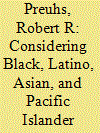| Srl | Item |
| 1 |
ID:
090852


|
|
|
|
|
| Publication |
2009.
|
| Summary/Abstract |
We examine activities of and between minority advocacy groups in the U.S., particularly similarities and differences in positions of Blacks and Latinos in their efforts to influence national-level policies. Findings highlight several points. Analysis of Congressional scorecard data indicates only modest overlap among the issues identified by the minority advocacy groups, though there is complete "congruence" on the issues that are identified by both groups. The highest degree of "independence" of the activities examined occurs in Congressional testimony. Regarding legal advocacy, analysis of amicus curiae briefs further affirms the general finding that there is little if any outright competition between Black and Latino advocacy groups. There appears to be considerable "tacit non-cooperation" which varies by policy-type and between these national institutions.
|
|
|
|
|
|
|
|
|
|
|
|
|
|
|
|
| 2 |
ID:
184473


|
|
|
|
|
| Summary/Abstract |
Most of the literature on racial or ethnic groups’ foreign policy preferences focuses on parochial or diasporic interests to demonstrate group-specific influence in this policy realm. This situation leaves room for addressing the impact of African American, Latino and Asian American, and Pacific Islander (AAPI) racial/ethnic identities on individual-level preferences for broader, non-parochial, foreign policy issues and the degree to which multiracial preference coalitions (or agreement) emerge in a fashion reflective of domestic policy attitudes. Utilizing data on a range of contemporary foreign policy issues from the 2018 and 2019 Congressional Cooperative Election Studies (CCES), the analyses reveal that minority preference coalitions emerge across a wide range of foreign policy issues, a pattern that is most dramatic among Latino and Black Democrats. Moreover, these coalitions suggest minority moderation relative to white co-partisans from both parties.
|
|
|
|
|
|
|
|
|
|
|
|
|
|
|
|